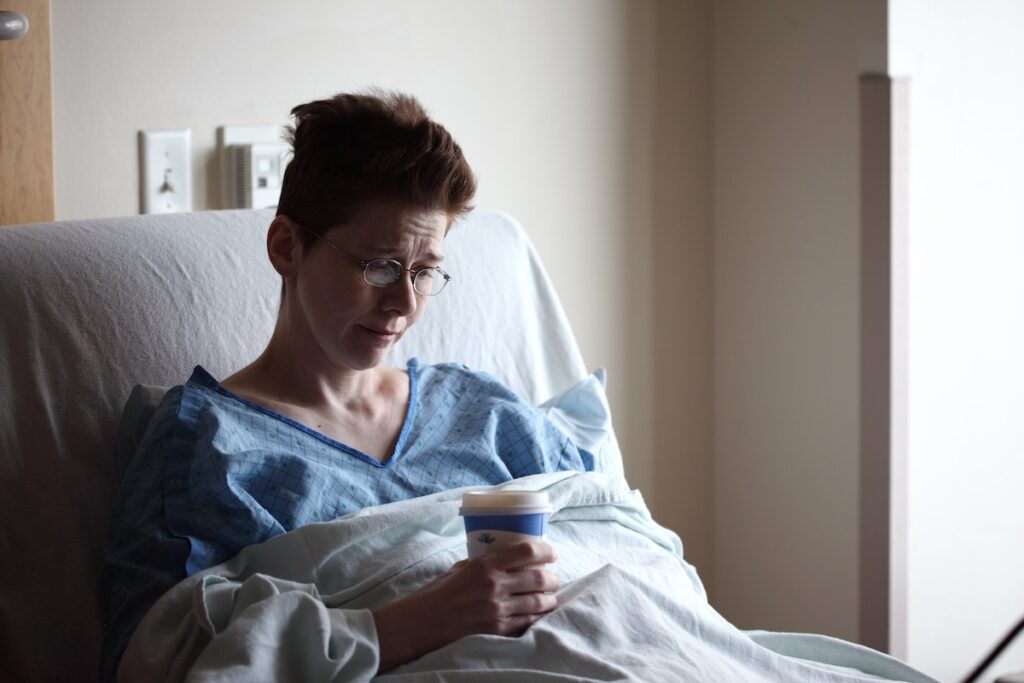
Acute care is an important priority for mental health services but has had little research attention (Johnson et al., 2022). Service user experiences of acute care can often be poor and care can be coercive, so investigating improvements through research is a priority. A Cochrane review in 2015 found only 8 randomised controlled trials (RCTs) of crisis intervention models for people with serious mental illness, with the earliest trial conducted in 1964 and only 2 trials conducted since 2000 (Murphy et al., 2015).
Performing randomised trials in crisis care is very challenging, with researchers facing difficulties with recruitment, obtaining informed consent, and ethical designs. Given this, it is exciting to see new RCTs such as this study by Cornelis at el (2022). The team based in The Netherlands conducted a randomised controlled trial comparing intensive home treatment to treatment as usual for people presenting in acute psychiatric crisis (Cornelis et al., 2022).
Home treatment (or crisis resolution) teams are offered in the UK as an alternative to hospital admission, in which less restrictive care can take place in the community and work with people’s social networks. Previous research has suggested that well-implemented home treatment can reduce the number of days spent in the hospital, but has been mixed for other outcomes such as symptom reduction and service user satisfaction with services (Johnson et al., 2005; Stulz et al., 2020).

Are home treatment teams more effective compared to usual care in an acute mental health crisis? This new trial conducted in Amsterdam investigates.
Methods
Cornelis et al (2022) conducted an RCT comparing intensive home treatment versus treatment as usual, based at 2 centres within the Amsterdam Psychiatric Emergency Service.
This study used an interesting modification to the traditional RCT called a Zelen design (Simon et al., 2021), in which participants are randomised before the consent stage. This potentially raises ethical issues, but the authors argue in the protocol (Cornelis et al., 2018) that as patients in the study are in the midst of a psychiatric crisis, they feel it is unethical and impractical to ask for informed consent prior to randomisation, as this would delay urgent treatment, participants may initially lack insight into their illness and it would impact the motivation of patients and families for home treatment.
- Participants had to be Dutch-speaking residents of Amsterdam, aged 18-65 years, diagnosed with at least one DSM-IV or V mental health disorder (but not primarily a substance use disorder) and experiencing an acute severe psychiatric crisis for which a psychiatrist indicated an admission to a clinical crisis care unit.
- Potential participants were screened for inclusion when they arrived at the psychiatric emergency service, then randomised and the allocated treatment commenced. The research team then contacted the treating clinicians within the next working hours and obtained informed consent as soon as the participant was considered ‘mentally capable’ (that’s equivalent to ‘having capacity’ in the UK).
- Intensive home treatment (IHT) (up to 3 home visits per day from a multidisciplinary team) was compared to ‘treatment as usual’ (TAU) (hospital admission followed by outpatient care up to twice per week).
Researchers collecting outcome data were blinded, but the patients or clinicians delivering the intervention were not. The primary outcome was the number of days spent in the hospital between randomisation and 12 months, with secondary outcomes measuring symptom severity, quality of life, and patient satisfaction.
Results
246 patients were included in the study. 2,147 patients presenting in crisis were assessed for eligibility, with 547 then randomised. 23 people were excluded because they did not have capacity to consent within 2 weeks of randomisation. A substantial number declined to take part (67% of those randomised to TAU vs 45% randomised to IHT).
Primary outcome
- The availability of intensive home treatment (IHT) reduced the number of hospital days after 1 year by 36.6%.
- This was a reduction of 24.55 days spent in hospital, from a mean of 67.02 days in the TAU group to 42.47 days in the IHT group (p=0.033).
Secondary outcomes
- There was no difference in the number of
- Participants admitted within 6 weeks or 12 months and no difference in the average number of admissions per person
- People admitted involuntarily at 1 year
- Participants with an adverse event. There were 26 adverse events overall, 89% of which were suicide attempts. There were five deaths by suicide (2 deaths in both groups between 6 weeks and 6 months and one in IHT after 6 months).
- The IHT group showed lower measured symptoms of depression and anxiety at 6 weeks, but this effect disappeared at 6 months and disappeared when a sensitivity analysis was performed.
No other significant differences were seen in symptom severity, quality of life or satisfaction with treatment.

The availability of home treatment reduced the number of days spent in hospital, but not the number of admissions or the number of adverse events.
Conclusions
The authors conclude:
Intensive home treatment (IHT) substantially reduces the use of hospital beds in acute psychiatry, without compromising patient safety.
They found no difference in symptom severity, quality of life, or symptom satisfaction, which is consistent with previous studies.
They state that they found no difference in adverse events or compulsory admissions, although note that:
…because suicides and suicidal behaviour are rare, our study did not have the power to measure a difference between the conditions.

This Dutch trial concludes that: “Intensive home treatment substantially reduces the use of hospital beds in acute psychiatry, without compromising patient safety”.
Strengths and limitations
The study appeared robust and it is interesting to see methodological innovations being made in the challenging area of acute mental health care research. The study demonstrates how the Zelen design can be a practical modification for trials in acute care, although randomising participants prior to consent raises ethical issues. These concerns may be greater in trials evaluating new interventions, whereas home treatment is already in wide use. Ethical concerns also have to be weighed against the ethics of delivering acute care based on the findings of a small number of relatively old trials. An issue in this study is that it appears that if a participant had the capacity to consent when they entered the trial, they were potentially not offered the opportunity to provide informed consent right at the start of the study, instead waiting until the next working day.
However, it was not mentioned in the paper whether there was a patient and public involvement (PPI) group involved in the study and whether these difficult ethical decisions were discussed with anyone with lived experience of acute care. Moreover, a large number of people who were eligible declined to take part in the study, most stating ‘general refusal’. It would be interesting to know more about the people who declined to take part and whether this related to the acceptability of IHT or the trial. Like in many trials, the participants may be different in important ways from those who are offered IHT in practice.

All trials in acute care raise difficult ethical issues, but the involvement of people with lived experience of acute care is likely to shed light on important questions that would otherwise go unanswered.
Implications for practice
The study is consistent with previous research in finding that IHT reduced the amount of time spent in hospital for people experiencing an acute mental health crisis. The average reduction of 24.55 days in hospital over 12 months seems clinically significant, especially as this study was performed in a modern crisis care system with a greater number of other care options than in previous studies. Therefore, the findings should be disseminated to clinicians and service users, to show that home treatment is an effective alternative to hospital admission. Importantly for those who might be worried about the risks of IHT, the study did not find any increase in adverse events or later compulsory admission, although there might not have been a big enough sample size to detect a difference.
Although the trial found a reduction in the number of days spent in hospital, it did not find a difference in the number of admissions. We agree with the authors’ statement that IHT needs to be considered as part of an acute care system that provides a choice of different options for care, including hospital and other alternatives, rather than a replacement. A future challenge for service development could also be to develop models that improve on these relatively modest advantages.
Implications for future research
If new models of acute care are developed, these could be tested using trials such as this one. In other areas of health, a larger number of trials have been conducted in acute care where there are similar challenges (for example in traumatic brain injury (CRASH 3 trial collaborators, 2019)). It could be interesting to review how trials are performed in other acute healthcare settings and consider how this could be applied to mental health.
For complex interventions such as acute care, there can be big differences between the findings of trials and in practice, and future research needs to address this. Implementation of home treatment teams across the UK has not resulted in the substantial decrease in hospital use that was hoped for (Johnson, 2013). Newer non-randomised methods have become more popular, for example synthetic controls (Bouttell et al., 2018). These approaches often rely on routine data which has its own pros and cons: for example, routine data can better represent the ‘real world’ but often does not capture outcomes that are important to service users. Study designs without randomisation are also vulnerable to residual confounding (Hemkens et al., 2016).
Given these challenges, we would say that all future acute care research studies should have patient and public involvement, with lived experience experts providing input into these difficult decisions.

Intensive home treatment should be provided as part of an overall acute care system that offers different options, rather than as a standalone intervention.
Statement of interests
Sonia Johnson has been a lead investigator on several studies focusing on home treatment teams, including randomised trials with similarities to the study reviewed.
Lucy Maconick has NIHR funding for a doctoral fellowship investigating outcomes and experiences of acute care for people with complex emotional needs, but this is not in conflict with this article.
Links
Primary paper
Cornelis, J., et al., The effectiveness of intensive home treatment as a substitute for hospital admission in acute psychiatric crisis resolution in the Netherlands: a two-centre Zelen double-consent randomised controlled trial. The Lancet Psychiatry, 2022. 9(8): p. 625-635 DOI: 10.1016/S2215-0366(22)00187-0
Other references
Bouttell, J., Craig, P., Lewsey, J., Robinson, M., & Popham, F. (2018). Synthetic control methodology as a tool for evaluating population-level health interventions. Journal of Epidemiology and Community Health, 72(8), 673-678. https://doi.org/10.1136/jech-2017-210106
Cornelis, J., Barakat, A., Blankers, M., Peen, J., Lommerse, N., Eikelenboom, M., Zoeteman, J., Van, H., Beekman, A. T. F., & Dekker, J. (2022). The effectiveness of intensive home treatment as a substitute for hospital admission in acute psychiatric crisis resolution in the Netherlands: a two-centre Zelen double-consent randomised controlled trial. The Lancet Psychiatry, 9(8), 625-635.https://doi.org/https://doi.org/10.1016/S2215-0366(22)00187-0
Cornelis, J., Barakat, A., Dekker, J., Schut, T., Berk, S., Nusselder, H., Ruhl, N., Zoeteman, J., Van, R., Beekman, A., & Blankers, M. (2018). Intensive home treatment for patients in acute psychiatric crisis situations: a multicentre randomized controlled trial. BMC Psychiatry, 18(1), 55. https://doi.org/10.1186/s12888-018-1632-z
Effects of tranexamic acid on death, disability, vascular occlusive events and other morbidities in patients with acute traumatic brain injury (CRASH-3): a randomised, placebo-controlled trial. (2019). The Lancet, 394(10210), 1713-1723. https://doi.org/10.1016/s0140-6736(19)32233-0
Hemkens, L. G., Contopoulos-Ioannidis, D. G., & Ioannidis, J. P. A. (2016). Routinely collected data and comparative effectiveness evidence: promises and limitations. Canadian Medical Association Journal,188(8), E158-E164. https://doi.org/10.1503/cmaj.150653
Johnson, S. (2013). Crisis resolution and home treatment teams: an evolving model. Advances in Psychiatric Treatment, 19(2), 115-123. https://doi.org/10.1192/apt.bp.107.004192
Johnson, S., Dalton‐Locke, C., Baker, J., Hanlon, C., Salisbury, T. T., Fossey, M., Newbigging, K., Carr, S. E., Hensel, J., Carrà, G., Hepp, U., Caneo, C., Needle, J. J., & Lloyd‐Evans, B. (2022). Acute psychiatric care: approaches to increasing the range of services and improving access and quality of care. World Psychiatry,21(2), 220-236. https://doi.org/10.1002/wps.20962
Johnson, S., Nolan, F., Pilling, S., Sandor, A., Hoult, J., McKenzie, N., White, I. R., Thompson, M., & Bebbington, P. (2005). Randomised controlled trial of acute mental health care by a crisis resolution team: the north Islington crisis study. BMJ, 331(7517), 599. https://doi.org/10.1136/bmj.38519.678148.8f
Murphy, S. M., Irving, C. B., Adams, C. E., & Waqar, M. (2015). Crisis intervention for people with severe mental illnesses [Review]. Cochrane Database of Systematic Reviews, 2015(12) (no pagination), Article Cd001087. https://doi.org/10.1002/14651858.CD001087.pub5
Simon, G. E., Shortreed, S. M., & DeBar, L. L. (2021). Zelen design clinical trials: why, when, and how. Trials, 22(1), 541. https://doi.org/10.1186/s13063-021-05517-w
Stulz, N., Wyder, L., Maeck, L., Hilpert, M., Lerzer, H., Zander, E., Kawohl, W., Grosse Holtforth, M., Schnyder, U., & Hepp, U. (2020). Home treatment for acute mental healthcare: randomised controlled trial. The British Journal of Psychiatry, 216(6), 323-330. https://doi.org/10.1192/bjp.2019.31
Photo credits
- Photo by christian koch on Unsplash
- Photo by Kyrie kim on Unsplash
- Photo by Alexander Grey on Unsplash
- Photo by UX Indonesia on Unsplash
